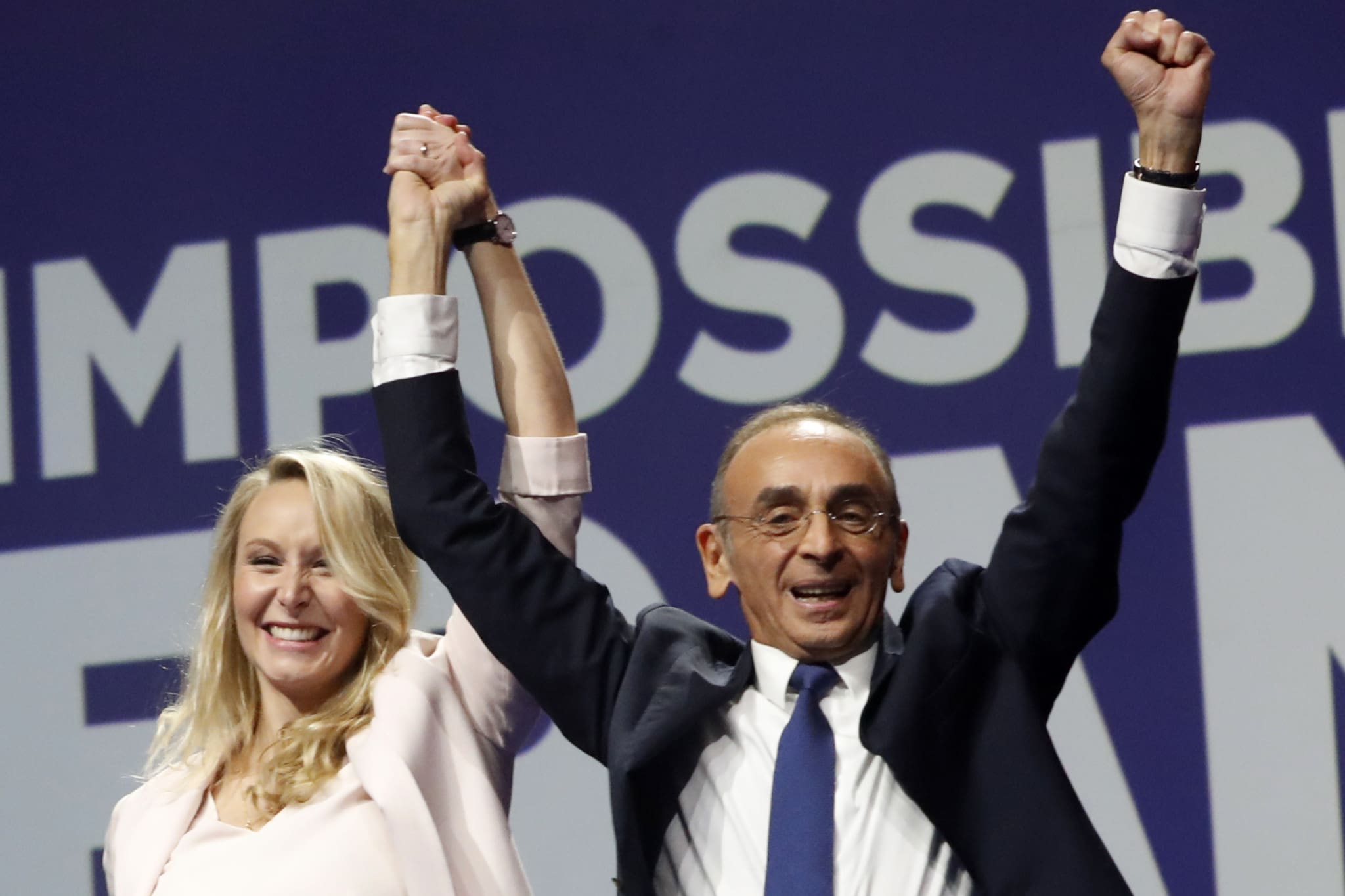A month ago, Éric Zemmour mentioned Marion Maréchal, Marine Le Pen’s niece and a central figure among French right-wing conservatives, as a possible prime minister in the event he wins the presidential election in April.
It was expected that Maréchal would eventually support Zemmour’s candidacy despite her family ties to her aunt, Marine Le Pen, who is Zemmour’s chief competitor for the conservative vote in the first round of the election on April 10. Maréchal is also the granddaughter of Jean-Marie Le Pen, who first founded the French National Front, which his daughter Marine renamed National Rally (Rassemblement national, RN) in 2018.
In 2012, Maréchal was elected to the French National Assembly by a substantial margin, as a National Front deputy. Being aged 22 at the time, she was the youngest deputy the French V Republic ever had. A practicing Catholic and a natural-born charismatic political leader, she was seen as the most important figure of the National Front’s conservative wing. It was at a time when her aunt Marine Le Pen, having been made the FN’s chairwoman in 2011, embarked on an effort to transform the National Front into a party that would be “neither of the right nor of the left,” hoping it would soon cease to be “demonized” in the mainstream media.
[pp id=30366]
Feeling increasingly isolated by her aunt and her entourage, Maréchal, who is now 32, left politics in 2017. However, many among French conservatives have never lost their hope in the prospect of this young, intelligent, and charismatic woman coming back to the political ring and possibly becoming their future presidential candidate. All the time she spent at the head of the higher education school she founded in Lyon in 2017 with the aim to train the country’s future conservative elites (and which collaborates with the Mathias Corvinus Collegium in Budapest and the Collegium Intermarium in Warsaw), she was closely watched by the media, and even more so since it became clear Zemmour would run for president, to see whom she would support: Marine Le Pen or Éric Zemmour.
Last October, she declared on television that “maybe it will be necessary at some point to ask the question of who is better placed.” In January and February, there were several high-profile defections from Le Pen’s party to Zemmour, and on Feb 16, Nicolas Bay, who was probably the National Rally’s last heavyweight-conservative member, left his party for Zemmour as well. Bay, a Catholic like Marion Maréchal, was vice-president of the Identity & Democracy Group in the European Parliament. MEP Gilbert Collard, another National Rally executive who joined Zemmour’s Reconquest party in January, confirmed in an interview for Remix News two weeks ago that, after Bay’s departure, there are no conservatives left in Marine Le Pen’s party.
[pp id=24532]
On Sunday, March 6, at Éric Zemmour’s campaign rally in Toulon, it was Marion Maréchal’s turn to come out in favor of this former right-wing conservative journalist and essayist who constantly refers to General de Gaulle’s legacy.
“I am certain that political transformation will take place and I believe again that victory is possible,” she told the 8,000-strong crowd gathered at the port city in the southeast of France. On the same day, the conservative weekly Valeurs Actuelles published an interview with Maréchal, where she explained her motives.
“I am joining the candidate that I consider today to be the best placed to lead the ideas that I have always defended to victory. I come as an ally in this great gathering of the right that he calls for,” she said.
“I was absolutely convinced that a political space had been neglected for years, notably because of the National Rally’s ideological and strategic choices. (…) From the moment Éric Zemmour, with his fame, his personality, and his outspokenness, had the intention to seize this political space, the option did not seem to me crazy and even less lost in advance.”
For Marine Le Pen’s niece, a liberal-conservative like Zemmour (while Marine Le Pen is more of a social-progressive), Éric Zemmour has managed to attract “voters and elected officials from the RN, [center-right] LR and elsewhere,” and therefore to “weaken the cordon sanitaire.”
Indeed, she says, “when we see people like Éric Ciotti, François-Xavier Bellamy, Étienne Blanc, and other LR senators explain that in case of a second round between Éric Zemmour and Emmanuel Macron, they would vote for Zemmour, it is a very strong political and symbolic signal. It suggests there is a large pool of votes.”
Maréchal also said: “My choice is of an ideological nature. I find in Éric Zemmour many of the positions that I defended within the RN, without necessarily being heard, notably on the economy, Europe, and so-called societal issues. I also admire his intellectual courage, he is a man who does not let himself be intimidated by the intellectual terrorism of political correctness. (…) Above all, I share with him the idea that the civilizational struggle is the most important one. By civilizational struggle, I mean of course the question of migration, culture, and demography. (…) For all those reasons, I do not feel today that I am following a political party, but rather my convictions.”
Asked whether the fact she was throwing her weight behind Zemmour’s candidacy meant a lasting return to politics, Maréchal replied: “For several months now, I have been boiling with rage in the face of the situation in our country. With the worsening of the situation in France and the outrage I feel when observing current events, I was less and less able to remain in an analytical role. Obviously, the vital issue of the presidential election has further fueled my desire for commitment and feeling of responsibility. My involvement in the presidential campaign in support of Éric Zemmour will therefore be active and total. And yes, it can be considered a lasting return to political action.”
As she explained, she will not be a candidate in the June legislative elections because she is due to give birth to her second child around that date (Maréchal has been married since September 2021 to Vicenzo Sofo, an Italian MEP who belonged to Salvini’s League but who switched to Meloni’s Brothers of Italy when Salvini decided to support the Draghi government). She will nonetheless “actively contribute” to build a presidential majority in parliament, where alliances will probably be necessary with Marine Le Pen’s party and the center-right Les Républicains (LR) party, if only with its conservative wing.
[pp id=20534]
An Ifop survey published last summer showed that Maréchal is one of the best-known political figures in her country and that she has a very positive image among right-wing voters and also in the eyes of some left-wing voters. Her electoral potential was calculated at 28 percent by Ifop compared with only 18 percent for Zemmour.
Among the LR electorate, 66 percent said they had a good opinion of her, versus 86 percent among those voting for the National Rally. Of those favoring the La France Insoumise (LFI) party led by Jean-Luc Mélenchon, the best placed of the left-wing candidates against Macron in the run-up to the April election, 32 percent thought well of Maréchal. It is therefore clear that Zemmour has gained a powerful ally by securing the endorsement of Marine Le Pen’s niece.
It is the kind of support that can make a difference.
Both Zemmour and Maréchal spoke at the Budapest Demographic Summit last September and had a joint meeting with Hungarian Prime Minister Viktor Orbán, with whom they seemed to be sharing many common views.





